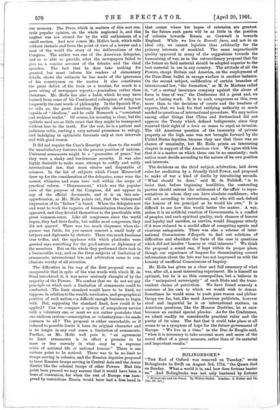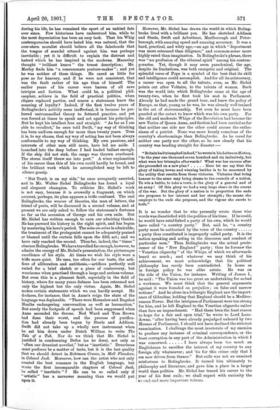BOLINGBROKE.*
" THE Earl of Oxford was removed on Tuesday," wrote Bolingbroke to Swift on August 3rd, 1714, " the Queen died on Sunday. What a world it is, and how does fortune banter us." And Bolingbroke was not only bantered by fortune
* Bolingbroke and his Times. By Walter BicheL London : J. Nisbet and Co. [128. 6d. net.]
during his life, he has remained the sport of an unkind fate ever since. Few historians have understood him, while to the most depreciation has been an easy task. That his Whig contemporaries should have hated him was natural, that the over-stern moralist should believe all the falsehoods that the tongue of scandal uttered against him was perhaps inevitable ; yet it is difficult to explain the distrust and hatred which he has inspired in the moderns. Macaulay thought " brilliant knave " the truest description; Mr. Morley finds him "a consummate posture-maker " ; and yet he was neither of these things. He cared as little for pose as for knavery, and if he were not consistent, that was the fault rather of his age than of himself. The earlier yearn of his career were barren of all save intrigue and faction. What wuld he, a political phil- osopher, achieve in the field of practical politics, when cliques replaced parties, and scarce a statesman knew the meaning of loyalty ? Indeed, if the first twelve years of Bolingbroke's activity seem ineffectual, it is because he pre- ferred untrammelled theory to fettered practice, and yet was forced at times to speak and act against his principles. But he kept his intellect free and straight. " As far as I am able to recollect," he once told Swift, "my way of thinking has been uniform enough for more than twenty years. True it is, to my shame, that my way of acting has not been always conformable to my way of thinking. My own passions, and interests of other men still more, have led me aside. I launched into the deep before I had loaded ballast enough. If the ship did not sink, the cargo was thrown overboard. The storm itself threw me into port." A wiser explanation of his career than this of his own could hardly be found, and the brilliant work which he accomplished may be left to silence gossip.
" But Truth is on my side," he once arrogantly asserted, and in Mr. Walter Sichel Bolingbroke has found a loyal and eloquent champion. To criticise Mr. Siohel's work is not easy, because it is avowedly a fragment, on which account, perhaps, its plan appears a trifle confused. The real Bolingbroke, the weaver of theories, the man of letters, the friend of poets, will be discussed in a second volume, and at present we are only asked to follow the statesman's fortunes so far as the accession of George and his own exile. But Mr. Sichel has written enough to earn our admiring thanks. He has pursued his history in the right spirit, and has begun by mastering his hero's period. The mice-en-scene is admirable; .anstravelled Thus el: nnponfoartftab eh, reineanfiddcuthgduah, aethtetel;y"anptimraid :sews d'e' enough, however, to admire the energy of Mr. Sichel's presentation, the picturesque excellence of his style. At times we wish his style were a trifle more quiet. He uses, too often for our taste, the arti- fices of alliteration and antithesis,—artifices perfectly well suited for a brief sketch or a piece of controversy, but wearisome when practised through a large and serious volume. But even this is a pleasant fault, especially in the field of history, where for many years dulness has been esteemed not only the highest but the only virtue. Again, Mr. Sichel makes certain statements which we can hardly accept. He declares, for instance, that in Anne's reign the state of the language was deplorable. " There were Hounslow and Bagshot Heaths endangering conversation as well as locomotion." But surely the footpads of speech had been suppressed when Anne ascended the throne. Ned Ward and Tom Brown had done their worst, and the process of purifica- tion had already been begun by Steele and Addison. Swift did not take up a wholly new instrument when he sat him down under Dutch William to write The Tale of a Tub. Nor do we think that Mr. Sichel is justified in condemning Defoe (as he does), not only as "often our dreariest novelist," but as "inartistic." Dreariness must perforce be a matter of taste, but it is the last quality " artistic" has a narrower meaning than we would put upon it the esvbcet treatment r e a euntil n t ohf Bolingbroke. the curtain the u rpe protagonist n:ganovan that we should detect in Robinson Crusoe, in Moll Flanders, in Colonel Jack. Moreover, how can the artist who not only created the best romance in the English language, but wrote the first incomparable chapters of Colonel Jack, be called " inartistic " ? He can be so called only if However, Mr. Sichel has drawn the world in which Boling- broke lived with a brilliant pen. He has sketched Addison and Steele, Swift and Arbuthnot, Marlborough and Peter- borough, with amazing speed and amazing accuracy. It was a hard, practical, and witty age,—an age in which " deportment was more esteemed than diligence," and common-sense more highly rated than imagination. In Bolingbroke's phrase, there was "no profusion of the ethereal spirit" among his contem- poraries. Yet, though it may seem paradoxical, the age, despite its limitations, was both energetic and original. The splendid verse of Pope is a symbol of the best that its skill and intelligence could accomplish. And for all its aristocracy, a career was open to all the talents, even, as Mr. Sichel points out after Voltaire, to the talents of women. Such was the world into which Bolingbroke came at the age of twenty-two, when he first took his seat in Parliament. Already he had made the grand tour, and knew the policy of Europe, so that, young as he was, he was already well trained in the art of statesmanship. Yet even he must have been puzzled at the outset to know which was his own party. For the old and moderate Whigs of the Revolution had become the new Tories of Queen Anne, and faction had been carried so far that neither one side nor the other could arouse the enthu- siasm of a patriot. None was more keenly conscious of the country's shortcomings than Bolingbroke. As he cared for neither one party nor the other, so he saw clearly that his country was heading straight for disaster :— " Britain had triumphed indeed," he wrote in his Letters on History, "to the year one thousand seven hundred and six inclusively, but what were her triumphs afterwards? What was her success after she proceeded on a new plan P Here let me say that the glory of taking towns and winning battles is to be measured by the utility that results from these victories. Victories that bring honour to the arms may bring shame to the councils of a nation. To win a battle, to take a town, is the glory of a general and of an army ! Of this glory we had a very large share in the course of the war. But the glory of a nation is to proportion the ends she proposes to her interest and her strength ; the means she employs to the ends she proposes, and the vigour she exerts to both."
It is no wonder that he who presently wrote these wise words was dissatisfied with the politics of his time. If he could, he would have established a party of his own, which he would have called " a country party." But, said he, " a country party must be authorised by the voice of the country a party thus constituted is improperly called party. It is the nation speaking and acting in the discourse and conduct of particular men." Thus Bolingbroke was the actual prede- cessor of the " New England " party ; thus he foresaw the " Venetian oligarchy " of the Whigs, of which we afterwards heard so much ; and whatever we may think of his achievement, we must acknowledge that his political philosophy has rarely been contradicted. In borne as in foreign policy he was alike astute. He was on the side of the Union, for instance. Writing of James I., he said : " The Union was too great an undertaking for so bad a workman. We must think that the general arguments against it were founded on prejudice; on false and narrow notions." And he alone in a lethargic England saw the import- ance of Gibraltar, holding that England should be a Mediter- ranean Power. But the intrigues of Parliament were too strong for him, and he left England to the Venetian oligarchs rather than face an impeachment. "Had there been the least reason to hope for a fair and open trial," he wrote to Lord Lans- downe, "after having been already prejudged unheard by two Houses of Parliament, I should not have declined the strictest examination. I challenge the most inveterate of my enemies to produce any instance of criminal correspondence, or the least corruption in any part of the Administration in which I was concerned I have always been too much an Englishman to sacrifice the interest of my country to any foreign ally whatsoever; and 'tis for this crime only that I am now driven from thence." But exile was not an unmixed misfortune to Bolingbroke. It turned him ultimately to philosophy and literature, and gave him a place in a larger world than politics. Mr. Sichel has traced his career to the year of his first exile; we shall expect with curiosity the s3 and and more important volume.







































 Previous page
Previous page